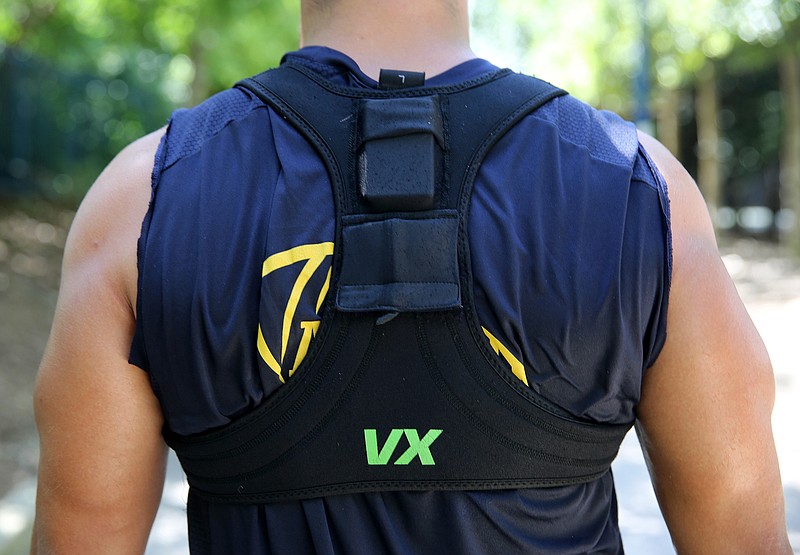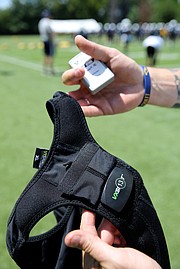University of Tennessee at Chattanooga strength and conditioning coach Chad Pearson found a way to instill a level of competition within the football team this summer while also eliminating the excuses.
The football program has started using GPS devices that track any number of things - speed, distance, acceleration - while also monitoring the heart rates of specific players. The devices are slid into the "smart vests" on the backs of the athletes, under the jerseys and shoulder pads, during practice.
Pearson believes UTC is the only Football Championship Subdivision program in the country that is using GPS tracking.
"If there is another one, it's not being run through strength and conditioning. It's being run through kinesiology departments, " Pearson said before Sunday morning's practice. "We used a similar product of a different company for five years at the University of Minnesota."
The devices have made the players choose to live healthier lives because they want to be in top shape for when they get tracked.
"What it does is create a competitive atmosphere," Pearson said. "When you look at the number of accelerations, the most high-speed yards as an effort thing, you can look at a guy and say, 'Hey, you took today off,' or 'Hey, you had it. You were really bringing it.' It's not that you're trying to catch guys not working, but rather you're creating an environment of getting after it every single day."
Pearson put together a presentation for vice chancellor and athletic director Mark Wharton and the football and women's soccer coaches as to the benefits of using it: the safety for athletes, their progression over time, wellness and a rate of perceived exertion.
"At the end of practice, the players rate on a scale of 1 to 10 how hard practice is," Pearson said. "We then compare that with the actual physical work they did and compare with their wellness, soreness, sleep, mood, appetite. If a guy has a high-output practice but ranks practice easy, we know that's a good thing. If after a couple of days, practices aren't as hard as they should be and he's ranking them very high, we need to look at their nutrition, regeneration and reps for that guy that make sure they're healthy.
"The big thing is we want these guys to be healthy, fast and strong all game all year."
The football team has 20 trackers: five each given to wide receivers and defensive backs, three to inside linebackers and two to outside linebackers, one to a tight end and two each to running backs and quarterbacks.
Senior receiver Joseph Parker had the fastest time at 23.3 mph until sophomore defensive back D.J. Jackson topped him at 24.1 mph.
The last time Pearson posted times, 14 of the 20 players topped 21 mph: all five receivers, four defensive backs, three linebackers and two running backs. Distance traveled is also measured, with Pearson noting that sophomore receiver Bryce Nunnelly topped 7,000 yards on three consecutive days.
"It's always competition, but it's nice to get the facts out on the field," Parker said. "Everybody talks and wants to race, but then something happens, something is wrong with somebody when it's time to race, so it's nice to get facts out there. It's really solidified people and made people work hard, because numbers don't lie."
Although head coach Tom Arth admitted he'd "love to use" one of the trackers, he said he'd rather be pleased with the results gained from the devices.
"It really helps us being smart in how we train and gives us information on how to best prepare our athletes for camp," Arth said. "The more data we collect and analyze, the better we can prepare. Seeing how our administration supports our football program, it's a great testament to me and to our team to know that we have an athletic department, an athletic director and a chancellor that sees the value in athletic programs and a successful football team. For them to be willing to invest in GPS systems that allow us to improve the way we do things says a lot about what we have here."
Contact Gene Henley at ghenley@timesfreepress.com. Follow him on Twitter @genehenley3.

